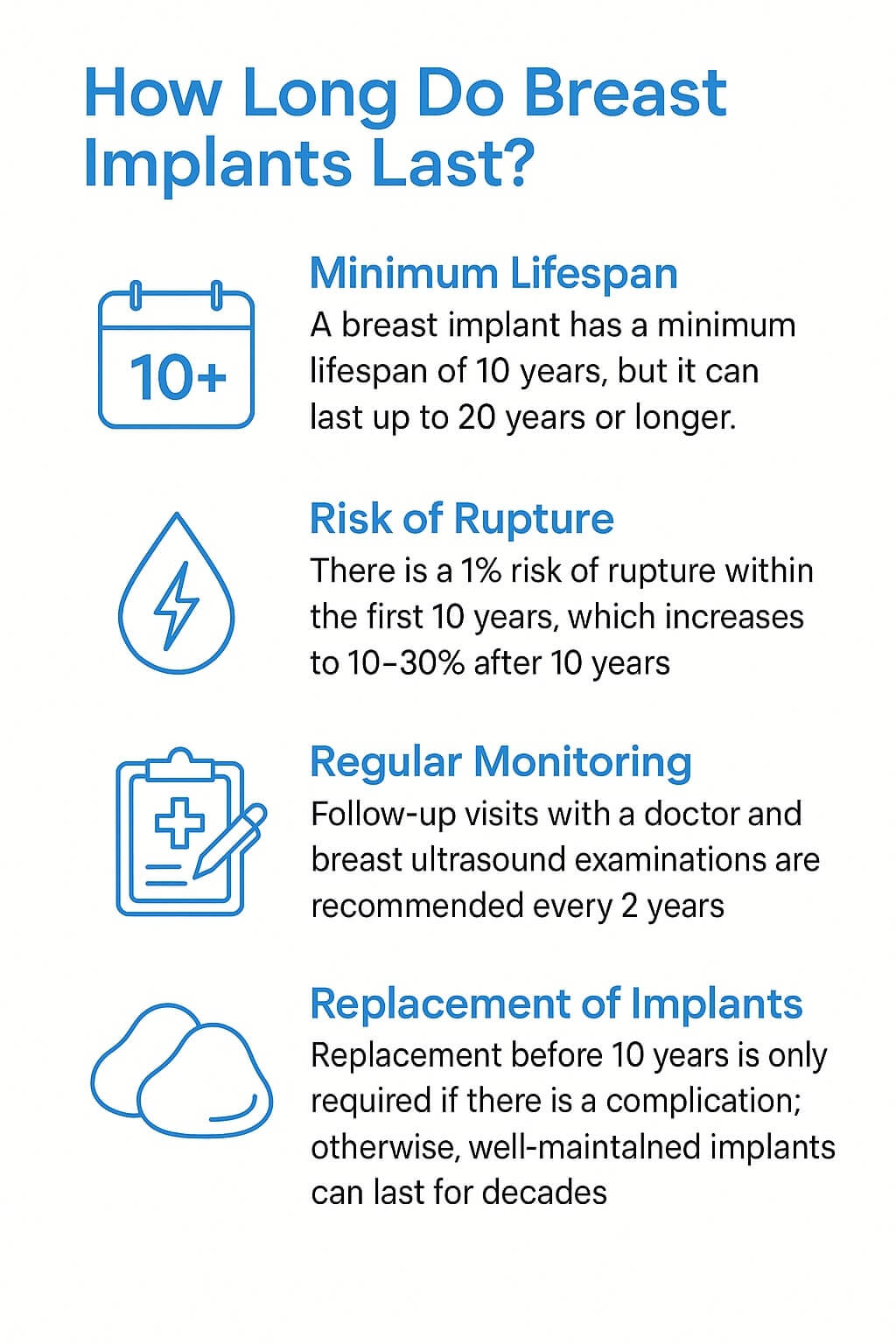
What is the lifespan of breast implants ?
🔎 In brief : Breast implants typically last between 10 to 25 years. While most are guaranteed for at least 10 years, regular medical check-ups are essential to detect any issues and determine if replacement is needed.
When a patient decides to get breast implants, one of the first questions she may ask is: how long will the implant last? Find out what breast implant surgery involves and how long breast implants typically last.
What is a breast implant ?
A breast implant is a prosthesis designed to increase the volume or size of the breasts, or to reshape them. Also known as a breast prosthesis, this type of implant is inserted during surgery. It consists of a soft silicone shell filled with silicone gel to achieve the desired shape and volume.
Breast implants help correct an aesthetic "imperfection" that may be a source of insecurity for the patient: a chest considered too small, asymmetry between the breasts, breast sagging (ptosis)...
Breast implants are also used to reconstruct the breasts after a mastectomy, which is often part of preventive or curative treatment for breast cancer.
Approximately 80% of breast implant procedures are purely cosmetic, with the primary goal of increasing breast size. The remaining 20% are reconstructive surgeries following mastectomy.
Breast augmentation is a popular cosmetic procedure because it offers very natural-looking results. There are various types and shapes of breast implants available, depending on the patient's needs and the natural shape of her breasts.
How long do breast implants last ?
According to the French National Agency for the Safety of Medicines and Health Products (ANSM), a breast implant has a minimum lifespan of 10 years. During this period, replacement—if needed—is covered by the manufacturer. This is the standard warranty offered by most laboratories that produce breast implants. However, the patient must still cover hospital fees.
Rest assured, your breast implant has only a 1% chance of needing replacement within the first 10 years after insertion. However, after 10 years, this risk increases to between 10% and 30%.
That said, the 10-year lifespan is just an average. A well-maintained breast implant can last up to 20 or even 25 years! In rare cases, patients have kept their implants for over 25 years.

How do you Know if a breast implant needs replacing ?
After breast implant surgery, patients must attend regular checkups. Every two years, an ultrasound should be performed to examine the condition of the implants and detect signs of rupture, leakage, or other complications. These early signs cannot be detected without medical imaging.
However, patients should also self-monitor their breasts for changes in shape, size, or volume. For instance, swollen lymph nodes, breast sagging, or breast hardening are signs that should raise concern—they may indicate an issue with the breast implant.
After 10 years, medical follow-ups should become more frequent, as the risk of implant rupture increases with time.
When should a breast implant be replaced ?
You may request to have your implant replaced before 10 years, but your plastic surgeon will only do so if there is a complication or change in the appearance of your breasts. A healthy breast implant should not be replaced unnecessarily.
However, if a complication arises, the implant must be replaced immediately—even if its average lifespan has not been reached. After 10 years, replacement is not mandatory if the implant remains in good condition, as in some women, implants can last up to 20 or 25 years.
Your doctor will closely monitor the condition of your breast implants. If replacement is necessary, they will inform you of the need for another surgery. Some doctors recommend replacing implants every 20 years, even without complications, to clean the area and prevent future issues.
Some laboratories offer breast implants with a lifetime warranty. This does not mean the implants last forever. Thanks to technological advancements, these implants may have a longer lifespan (up to 25 years, for example), but a check-up every two years remains essential to detect any potential complications.

Dr. Levent Acar - Docteur